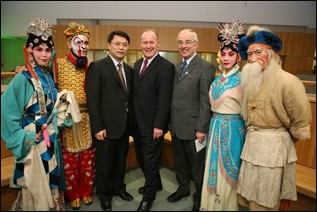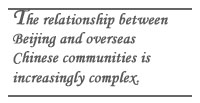The Gentle Dragon
The Gentle Dragon

University College Dublin, promote language and cultural programs like the Beijing Opera
SYDNEY: Media worldwide abound with reports about China’s economic prowess and rising military capabilities. Little noticed is China’s quiet effort to build “soft power” in its long-term objective of becoming a Great Power. China has found the source of its soft power in the millennia-old Chinese language and culture.
Not unlike France’s Alliance Française or Germany’s Goethe Institute, the Chinese government has set up more than 100 Confucius Institutes around the world in the last three years teaching Mandarin, especially to overseas Chinese to strengthen their cultural affinity with China. These institutes respond to a growing demand to learn Chinese, but there’s danger in academic institutions worldwide relinquishing Chinese studies to institutes run by the government of China.
China labels its strategic foreign policy as “Peaceful Rising,” reflecting cultural and historic experience while incorporating the concept of “soft power” as developed by Joseph Nye, dean of Harvard’s John F. Kennedy School of Government. Nye defines soft power as the ability to persuade through culture, values and ideas, as opposed to "hard power," or military might.

In 2003, Nye remarked that China – despite its growing economic power – seemed inexperienced in the use of soft power. Beijing made note, finding that trade and culture rather than military action are in accord with the principle of “non-interference in internal affairs.” Soft power also offered a possible solution to some of China’s most difficult international relationships, particularly relations with Taiwan and Southeast Asia.
Cultural diplomacy is not new to Beijing, which relied on “panda diplomacy” and “ping pong diplomacy” to influence international opinion, lowering Cold War tensions and easing China’s entry onto the world stage in the 1980s.
The Chinese government aims to secure access to raw materials for economic growth, maintain a peaceful environment and eliminate external threats. It therefore combines the attractions of trade and investment with soft-power diplomacy, an approach endorsed by Chinese defense-force leaders. China applies this diplomacy particularly to countries in the Asia-Pacific region, those with large ethnic Chinese communities, those with natural resources needed by Chinese industry and those with close relations with Washington.
In recent years the Communist Party improved its propaganda tools. Public-opinion polls measure the effectiveness of trade incentives combined with its new cultural diplomacy: Polls carried out by the Lowy Institute in Australia show a decline in the perception of China as a threat to peace and security; US commentators note China’s “charm offensive.”
In October this year, Beijing scholar Zhang Tuosheng summarized objectives of China’s foreign policy:
● equal priority of domestic and foreign affairs, where domestic affairs are defined as achieving a “well-off” society by 2020 and developing a framework for reunification with Taiwan;
● advocacy of a new security outlook;
● development of bilateral relations with foreign partners;
● “playing an active part in international affairs with emphasis on gaining ‘soft strength’ and acting as a responsible big country.”
The foremost objective of Chinese foreign policy is reunification with Taiwan, which for Beijing is an internal affair.
Ironically, Taiwan’s political leaders also endorse the use of soft power to a greater extent than perhaps any other country or region: Republic of China Vice President Lu Hsiao-lien visiting Europe in 2002 declared that soft power equated with values espoused by Taiwan such as democracy and feminism. To some extent, Beijing’s reliance on soft-power diplomacy is “me too” tactics, motivated by a perceived need to outdo anything that Taipei can offer.
The second goal is to establish China as a “Great Power” in the world – or “big country” in Zhang’s words.

China’s international relations also involve the overseas Chinese. This dates back to 1909 when the Nationality Law stated that ethnic Chinese anywhere in the world were citizens of China. The Communist government abandoned this position in the 1950s, but the relationship between Beijing and overseas Chinese communities is increasingly complex, with large numbers leaving China for work, study or business. While the government recognizes that Chinese who are citizens of other countries owe loyalty to those countries, its overseas missions monitor activities of local ethnic Chinese communities, especially university students. These make up the bulk of Chinese language departments in universities such as the University of Sydney.
China relies on nationalism to secure the loyalty of residents and overseas constituents, stemming from traditional views that China is the center of world civilization and that Han Chinese are superior to other racial groups.
This nationalism leads to the view that Chinese who live abroad lose their Chinese perspective. For instance, former Taiwanese leader Lee Teng-hui is seen as overly influenced by his education in Japan. The same view is held about some Hong Kong Chinese – that British rule, education and influence have led to inappropriate demands for democratic rights. The corollary of this line of thought is that people re-educated in Chinese language, with official government versions of Chinese history, would be more patriotic.
In 2003, as part of its soft-power diplomacy, the Chinese government unveiled a plan to set up Confucius Institutes around the world. Only 30 years ago, Confucius was reviled as a symbol of feudalism and entrenched power structures in society. Now, Confucius is a symbol of the cultural diplomacy goal to unite ethnic Chinese around the world.
The program is administered by the National Office for Teaching Chinese as a Foreign Language (Hanban), linked to the Chinese Ministry of Education and several other government departments. The first institute was set up in Tashkent in June 2004; Rutgers University, New Jersey, opened one in November 2007.
Confucius Institutes are generally located in host universities, benefiting from sponsors’ prestige in the competitive market for language courses. The arrangements minimize costs to the Chinese government; the Hanban subsidizes institutes with small seed grants in the set-up period.

With a history of only three years, it’s too early to analyze the extent of Chinese government control of the program, but some observations can be made: Countries welcome the program’s resources for teaching Chinese. Nations that anticipate growing economic and political ties with China, such as Australia, benefit from greater proficiency in Chinese language and culture. Australians just elected Labor leader Kevin Rudd, the first Chinese-speaking prime minister outside what is known as Greater China. He’s a product of Australia’s growing Chinese language program.

However, Australia already has many Chinese language and culture classes that face competition from the institutes, which offer Chinese government-backed curriculum and teachers approved by China. The institutes have not yet revealed how they will handle students who support politically incorrect causes such as independence for Taiwan, full democracy for Hong Kong, human rights in China, religious freedom, a Free Tibet or Uighur independence.
The institutes are expanding their teaching role. An institute offering undergraduate language classes opened at University College Dublin. In April, Waseda University, Japan, signed an agreement to establish a CI that the Chinese government announced was the “first research-based Confucius Institute.”
Universities must preserve academic objectivity. The Confucius Institutes, insofar as they support culture and community outreach, are most valuable. If the program engages in university teaching or research, academic colleagues should beware of potential bias. The institutes’ close links with the Chinese government and party, at best, could result in the dumbing down of research and, at worst, produce propaganda.
This article is based on a lecture for The Sydney Institute on 19 November 2007 and will be published in an issue of the Sydney Papers. Click here for the lecture, with questions and answers, available as a podcast.
Jocelyn Chey is a former Australian diplomat, currently visiting professor at the University of Sydney.